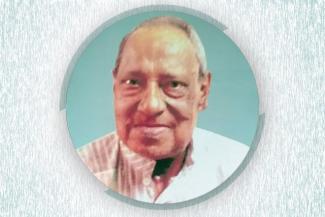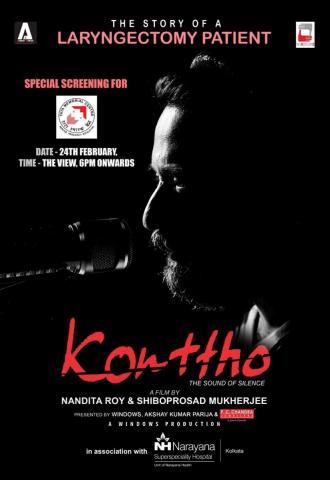
Dipanwita Mukherjee was a small girl when her father Bibhuti Bhusan Chakraverty was diagnosed with throat cancer. This is his story, how he overcame his condition and also how he reached out to many others to alleviate their pain. A recent Bengali film, Kontho, based on Mr Chakraverty’s life and struggles has also brought the story back in focus.
When was your father diagnosed with throat cancer?
My father, late Bibhuti Bhusan Chakraverty was detected with throat cancer in the year 1972. He was operated in the year 1974.
Can you share anything about the treatment procedure?
He was a chronic patient of cough & cold from childhood. On top of it, he was also a chain smoker which I myself have witnessed from childhood. Dr Nihar Ranjan Sarkar, a renowned doctor of the time, took up his case and convinced my mother and father to undergo laryngectomy. Initially he underwent radiation therapy before the laryngectomy surgery.
The first sign was the sinking of his voice which he lost gradually. Dr Nihar Sarkar sent him to Dr Saroj Gupta and my father had to go through 25 RT (Radiation Therapy) treatment under Dr Gupta. The treatment gave him relief for one year or so. However, he started facing the same problem again and doctors did not take further risk and went for Laryngectomy, which means the removal of vocal cord, I.e., in my father’s case, the area which was affected.
How did he respond to the treatment?
I have always seen my father as a brave person. His family meant to him the most. So, he fully cooperated with the doctors to make the operation successful.
Did he completely lose his voice?
Yes he lost his voice completely after laryngectomy.
Shrenik Shah speaks with an Electrolarynx to motivate and inspire others.
How did he start his voice training?
Dr Nihar Ranjan Sarkar took personal interest to support my father and connected him to Ms Ruth Berry Margaretta ( later became Mukherjee), an Italian lady who helped my father learn the art of talking through Esophageal voice. My father was a fast learner and learnt the science of talking through Esophageal voice soon.
Who are the people with whom he started his training?
Possibly there were very few laryngectomees who could speak through esophageal voice at that point of time. People from wealthy families who were larynx cancer patients bought the electrolarynx machine from US or UK. My uncle also sent one to my father for his use.
Madam Ruth Berry inspired my father and convinced him to practice speaking with the help of esophageal voice for the benefit of the society specially for the poor who cannot afford to buy the machine. Further, my father realized that the machine was not very comfortable for many whose income largely depended on their voices like Bus conductors, gate keepers, rickshaw pullers, carpenters, etc.
Doctors also gave him the support to do something useful for the society and used to send many people with similar conditions to him to learn the art. He trained them without any fees.
Cancer-affected patients from big business families to poor villagers used to come to him to learn to speak through the esophageal voice. He opened the Laryngectomee Club with support from Dr Saroj Gupta at Thakurpukur Cancer Research Centre, Kolkata. He trained more than 300 patients who lost their voices due to cancer.
What was the response like?
He was always encouraged and acknowledged for his work. He earned a lot of awards for his service to the society.
We were just kids when he went to the CA zone. He and my mother never let us feel the struggle that they went through.
He was working with Eastern Railways and his office boss Mr Bandyopadhyay was also a very supportive person. My father always used to achieve the position of the best performer and was also acknowledged for his work.
Did he regain his voice and succeed the same with others?
Yes, he very much regained his voice. The voice quality was such that it was very normal to think that he was suffering from cough and cold. This was same for all laryngectomees. It would be worth mentioning that the voice of each of the laryngectomy sounds absolutely similar. May be because it doesn’t come out from the Larynx but the esophagus.

Has the Bengali new movie, Kontho, based on his life and his pioneering work been true to his story?
The Director/Writer of the new movie got inspired by my father’s life as a cancer survivor and framed the story in today’s perspective. I heard that my father met them in a show called – AALOY PHERA, where my father gave them a book written by him on how to learn to use esophageal voice. Some of the existing members of the Laryngectomee Club, started by my father, participated in the film.
Was he initially reluctant to go for speech therapy? What made him change his mind?
He was a real fighter and always had a positive outlook. He may not have shown much interest initially but was counselled by Dr Sarkar and Dr Gupta to try it out. Family was always a priority to him and the urge to go back to the normal life made him eager to learn the art of talking after losing his vocal cord.
What impact did his illness have on you as children and your mother?
We were too small when he was operated. To be honest, we never faced any kind of challenge or had to struggle because of his illness. My father was always a caring person. We studied in good school, went for dancing classes, singing classes. Every year we used to travel 2 to 3 times during vacations. It was all very normal.
I have always seen my mother as his greatest strength. The Eastern Railway authorities were also very supportive and stood by the family by giving my mother an opportunity to join Eastern Railway English Medium School at Liluah, Howrah as the Head Mistress. She would leave home at 6 am in the morning after organizing home and return at 7 pm every working day and yet had all the energy to fulfil the family needs My father in turn used to support her which ever way it was possible for him.
She was beside my father till his last breath.
How did you and your sibling cope with it? In retrospect, do you wish you had done anything differently?
We were just kids when my father was first detected with cancer. We were so small that it was not only difficult but impossible to understand the consequences. I wish, I was old enough to understand and support the family in true sense then.
What is your advice to other children who have a parent with cancer?
Faith and support - these two things have no alternative when someone in the family is cancer affected.
It would be worth mentioning that a supportive family can reduce the stress and challenges through which the sufferers go through.






